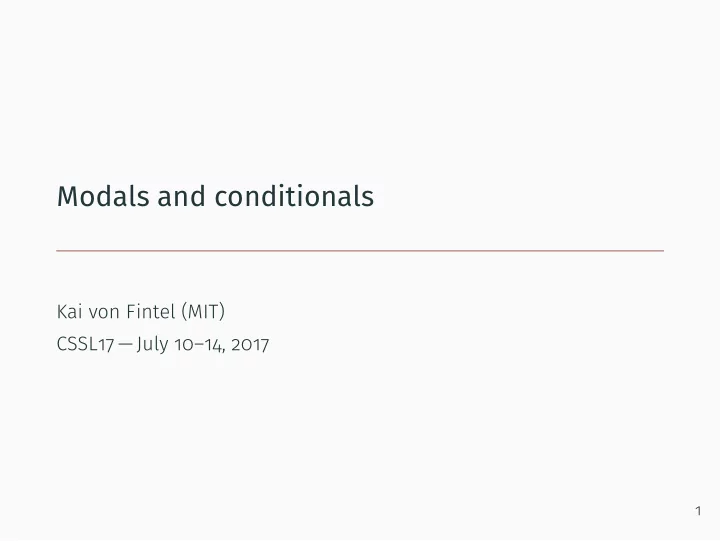

Famously, Kratzer relativized the semantics of modals to two parameters: • modal base (core flavor) • ordering source (comparing worlds in the modal base) 67
68
Iteration 69
(15) Cosette might have to be home by midnight. One modal embedded under the other: • epistemic might • deontic have to 70
71 home by midnight [ ] λw ′ . have to f 2 ( w ′ ) Cosette be home by midnight might f 1 ( w ) ⇝ the evidence leaves open that Cosette is required to be
More on strength 72
• there are many kinds of quantifiers over individuals (including cardinals, proportional, …) • modals show less variety 73
Weak necessity: (16) I don’t have to work on this tonight but I should. 74
75
von Fintel & Iatridou 2008: • weak necessity modals are necessity modals with an additional narrowing of their domain 76
Rubinstein 2014: • must/have to are sensitive to non-negotiable priorities only • should/ought to are sensitive to further priorities (i.e. negotiable) 77
Rullmann, Matthewson & Davis 2008: • narrowing of domain can make necessity modals as weak as possibility modals 78
Deal 2011: • when a language doesn’t have a necessity modal, the possibility modal can fill the void 79
von Fintel & Gillies 2010 vs. Lassiter 2016: Is epistemic must weaker than the bare prejacent? 80
(17) It must be raining. vs. (18) It’s raining. 81
2. If (again) 82
(19) If Rosa left before 6am, she got there in time. • epistemic flavor • worlds compatible with the evidence + where Rosa left before 6am • all of those worlds are worlds where she got there in time 83
Just like modals: • quantificational force (universal) • modal flavor (epistemic) • anchoring to actual world (actual evidence) plus: restriction to worlds where the antecedent is true 84
Obvious idea: if is a modal operator 85
86 if [ f ( w )] ( p ) ( q ) • the antecedent p • the modal flavor function f ( w ) • the consequent q true iff ∀ w ′ ∈ p ∩ f ( w ): q ( w ′ ) = 1.
An alternative (closer to what we said in the intro): • if p is a plural definite description of the p -worlds of a certain flavor • the consequent is claimed to be true in those worlds 87
88 = the plurality of worlds that contains the p -worlds in f(w) if [ f ( w )] ( p )
What happens when we combine the if p -plurality of worlds with the consequent proposition? • the consequent is a function from individual worlds to truth-values • it can’t be directly applied to a plurality of worlds The same thing happens in the case of pluralities of individuals! 89
(20) The students laughed. • the students denotes a plurality of individuals (made up of all and only the students) • laughed is a predicate of single individuals The combination needs to be mediated. 90
The students * laughed The *-operator “pluralizes” a predicate. The resulting plural predicate is true of a plurality iff the original predicate is true of every atom making up the plurality. 91
if p, * q true iff q is true of every world in the plurality of worlds denoted by if p (or more precisely, if f(w) p ). 92
Conditionals as plural definite descriptions: • Schlenker 2004 93
Xs and Os 94
(21) If Rose scored, we won. (22) If Rose had scored, we would have won. Sometimes: indicative vs. subjunctive Sometimes: indicative vs. counterfactual 95
(21) If Rose scored, we won. (22) If Rose had scored, we would have won. Sometimes: indicative vs. subjunctive Sometimes: indicative vs. counterfactual 95
Not always subjunctive: (23) If Rose had scored, we would have won. English has no subjunctive 96
Not always counterfactual: (24) a. If he had taken arsenic, he would be showing exactly these symptoms. Anderson 1957 b. If she brought pie, we would eat it rightaway. future less vivid (FLV) 97
Again, not counterfactual: (25) The murderer used an ice-pick. But, if the butler had done it, he wouldn’t have used an ice-pick. So the murderer must have been someone else. Stalnaker 1975 98
We need neutral terminology. O-marking : ordinary, open, “indicative” conditionals X-marking : the e x tra marking on counterfactuals, FLVs, etc. 99
Recommend
More recommend